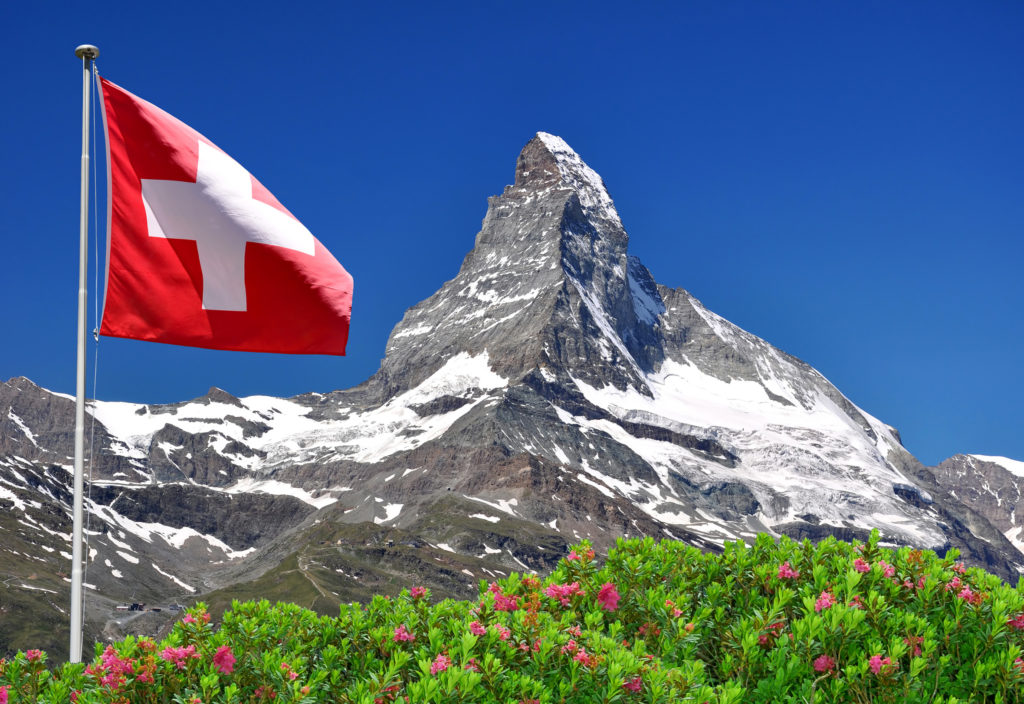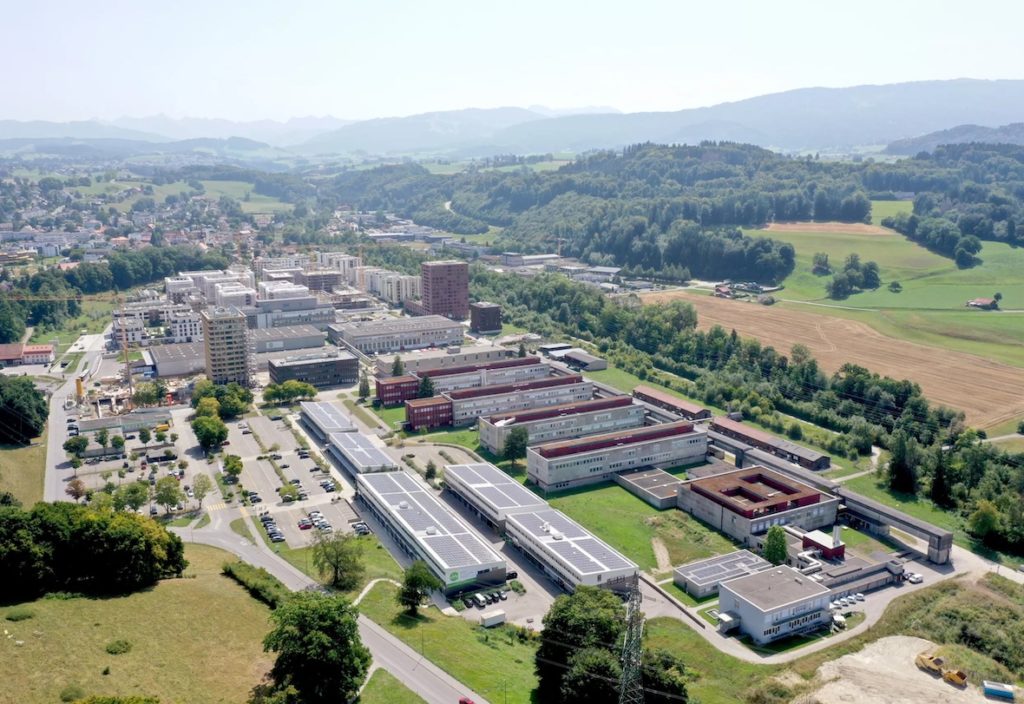
Why Switzerland?
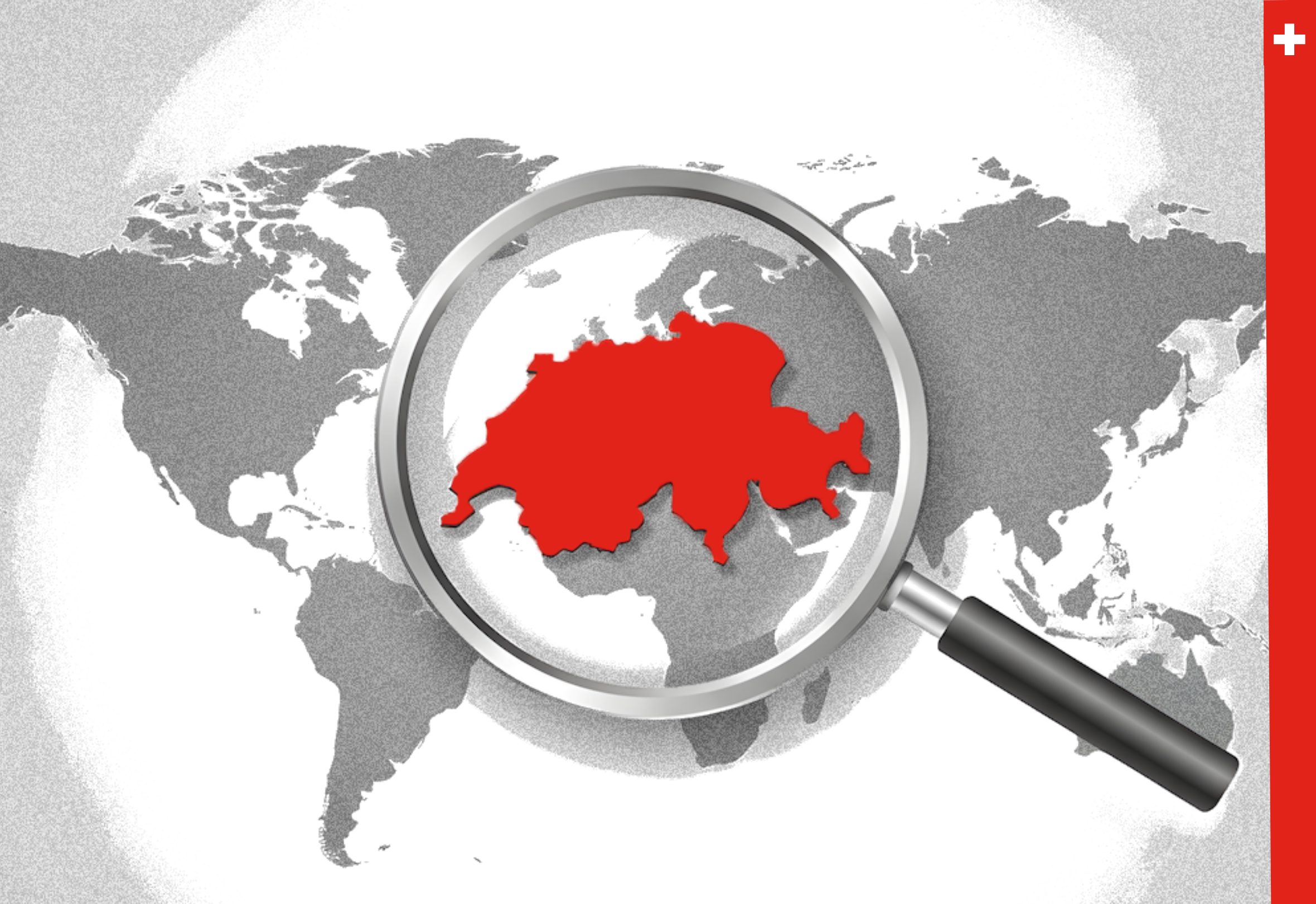
Switzerland’s rise from a resource-poor mountain country to one of the world’s most stable, competitive, and innovative economies reveals a unique blend of geography, governance, education, and long-term strategy.
Switzerland’s global reputation is often reduced to familiar symbols: watches, chocolate, mountains, banks. Yet these markers only scratch the surface of a country whose economic structure, political culture and innovation ecosystem are among the most advanced in the world. For a nation without access to the sea, without natural resources, and with 60 percent of its territory covered by mountains, Switzerland’s trajectory into the global elite of wealth, talent attraction and technological capacity is remarkable.
Switzerland consistently ranks at or near the top of international indexes measuring competitiveness, education, innovation, infrastructure and quality of life. One in seven residents is a millionaire. The average employee earns among the highest wages in the world, and unemployment remains below three percent. Beneath these figures lies a complex system shaped by neutrality, economic pragmatism, long-term planning and continuous investment in people and knowledge.
This article explores the historical roots of Swiss prosperity, its evolution into a modern innovation economy and the institutional foundations that sustain its competitiveness. It also draws on insights from Switzerland’s education and research landscape, its tax environment, social protection system, transport infrastructure and working culture to understand how the country has built and maintained one of the most resilient economic models of the last century.
Geography and history: turning constraints into strategic assets
Switzerland’s early history offers few clues that it would one day become a global economic powerhouse. Small, mountainous, fragmented and multilingual, it lacked the natural endowments and colonial networks that propelled many European powers. Its traditional exports were modest and limited to sectors such as textiles, precision mechanics and local craftsmanship.
The turning point: neutrality as economic positioning
Swiss neutrality was not originally a philosophical choice. It was imposed in 1815 by the great powers of Europe during the Congress of Vienna, following centuries in which Swiss mercenaries fought in foreign armies. For more than a century, this neutrality had limited effect on economic development. The transformation occurred only during the First World War.
As warring nations sought safe locations to store assets and manage transactions, Switzerland offered three decisive advantages: physical security, monetary stability and an attractive tax environment compared with countries financing war efforts through inflation and rising levies. Swiss banks saw their managed assets triple during the First World War and expanded further during the Second, when Switzerland’s infrastructure remained intact while much of Europe’s industrial capacity was destroyed.
Neutrality alone, however, is not an automatic economic advantage. Belgium declared neutrality in 1939 and was invaded within a year. Switzerland paired neutrality with deterrence, strategic terrain and an infrastructure prepared to withstand invasion. This combination established the country as a secure location for diplomacy, finance and trade. Today, Geneva hosts more than 40 international organizations including the United Nations Office at Geneva (UNOG), the World Health Organization (WHO), the World Trade Organization (WTO) and the International Telecommunication Union (ITU), making it one of the world’s largest centers for global governance.
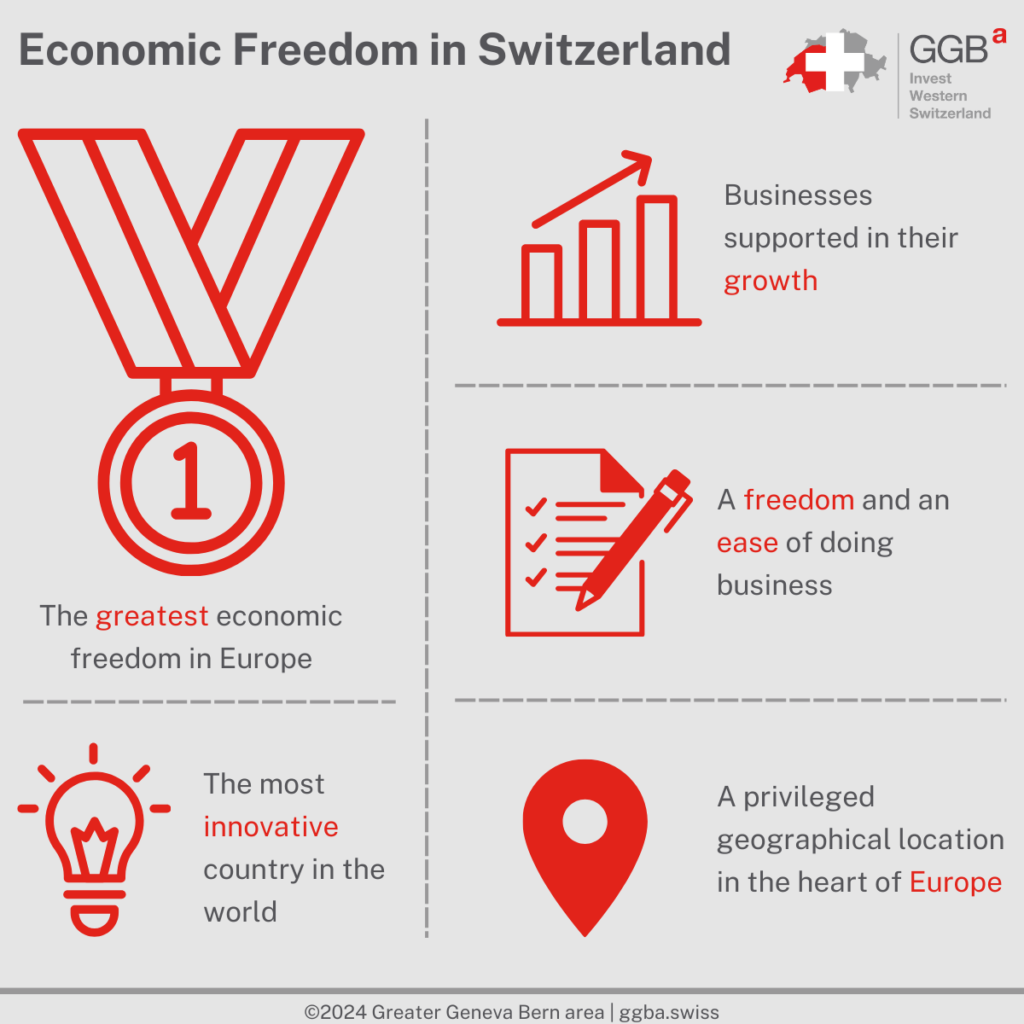
A modern economy built on diversification and high value creation
Beyond financial services and watchmaking, which together account for less than 12 percent of GDP, Switzerland’s economy is remarkably diverse and internationally oriented.
Life sciences: Switzerland’s global engine
The pharmaceutical and chemical industries represent almost half of Swiss exports. Global leaders Roche and Novartis anchor a broader ecosystem of biotech and medtech companies, research centers and contract manufacturers spread across Basel, Bern, Zurich, Lausanne, Zug and Ticino. Western Switzerland, in particular, has become a center for precision medicine, medical robotics and digital health, supported by institutions such as the Swiss Institute of Bioinformatics (SIB), the Inselspital and sitem-insel, Campus Biotech, the University of Geneva, the Lausanne University Hospital (CHUV) and EPFL.
Learn more about Life Sciences in Western Switzerland
Advanced manufacturing and engineering
Swiss industrial firms specialize in high-value, knowledge-intensive niches that require sophisticated engineering, quality control and long-term R&D. ABB, Georg Fischer, Schindler, Bobst and Sulzer exemplify a national approach centered on producing what is difficult to replace, rather than competing on cost.
Learn more about Precision and Robotics in Western Switzerland
Food and commodity trading
Although Switzerland has no natural resources, it is home to companies that shape global commodity flows. Geneva and Zug host leaders such as Vitol, Trafigura, Mercuria, Cargill International and Louis Dreyfus Company, which manage global trade in energy, metals and agricultural commodities. Nestlé, headquartered in Vevey, is the world’s largest food and beverage company.
Learn more about Agtech, Food & Nutrition in Western Switzerland
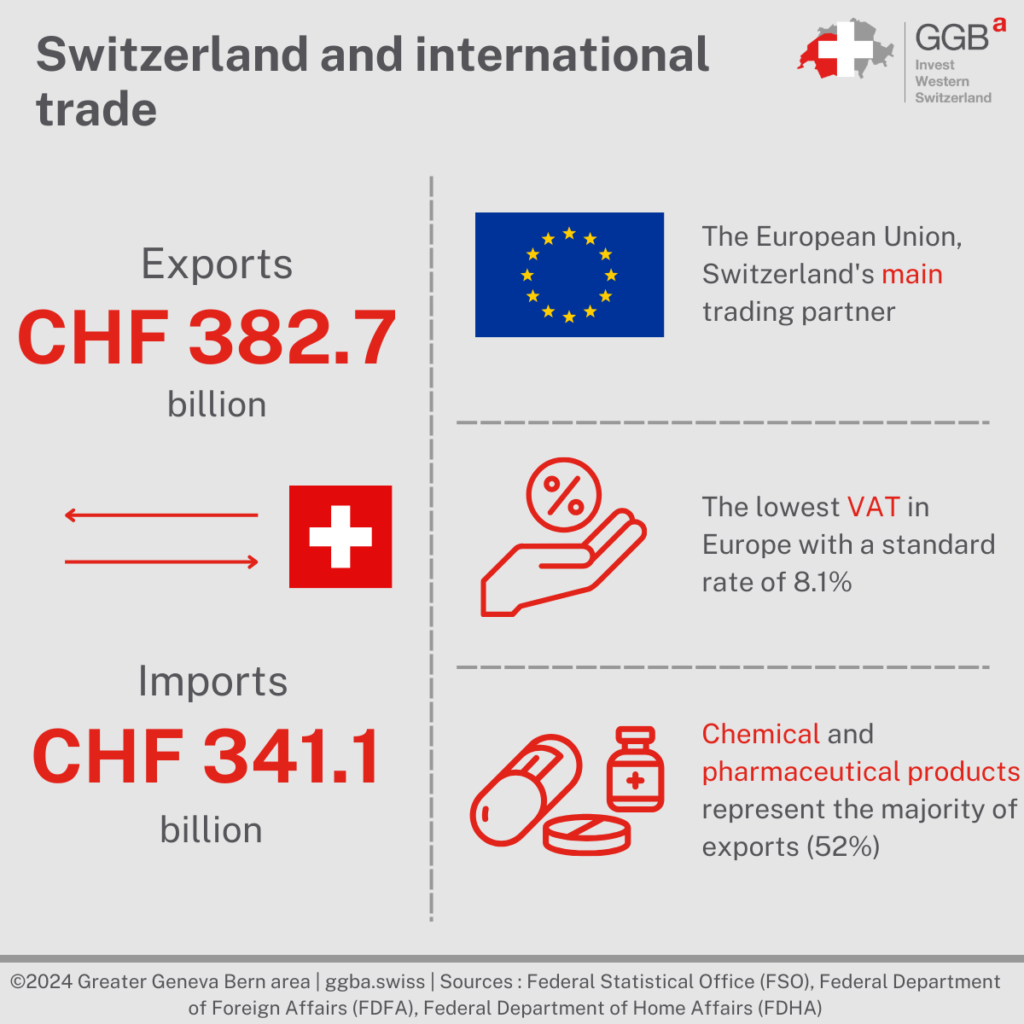
Logistics and transportation
Despite being landlocked, Switzerland is home to MSC, the world’s largest container shipping company. Its combined transport and logistics sector accounts for roughly four percent of GDP, supported by world-class rail connectivity and cross-border corridors linking Switzerland with Europe’s densest economic regions.
Construction and real estate
Construction and real estate together account for more than 20 percent of GDP, a substantial figure due to Switzerland’s geographic constraints, high urban density and sustained investment in infrastructure and energy efficiency.
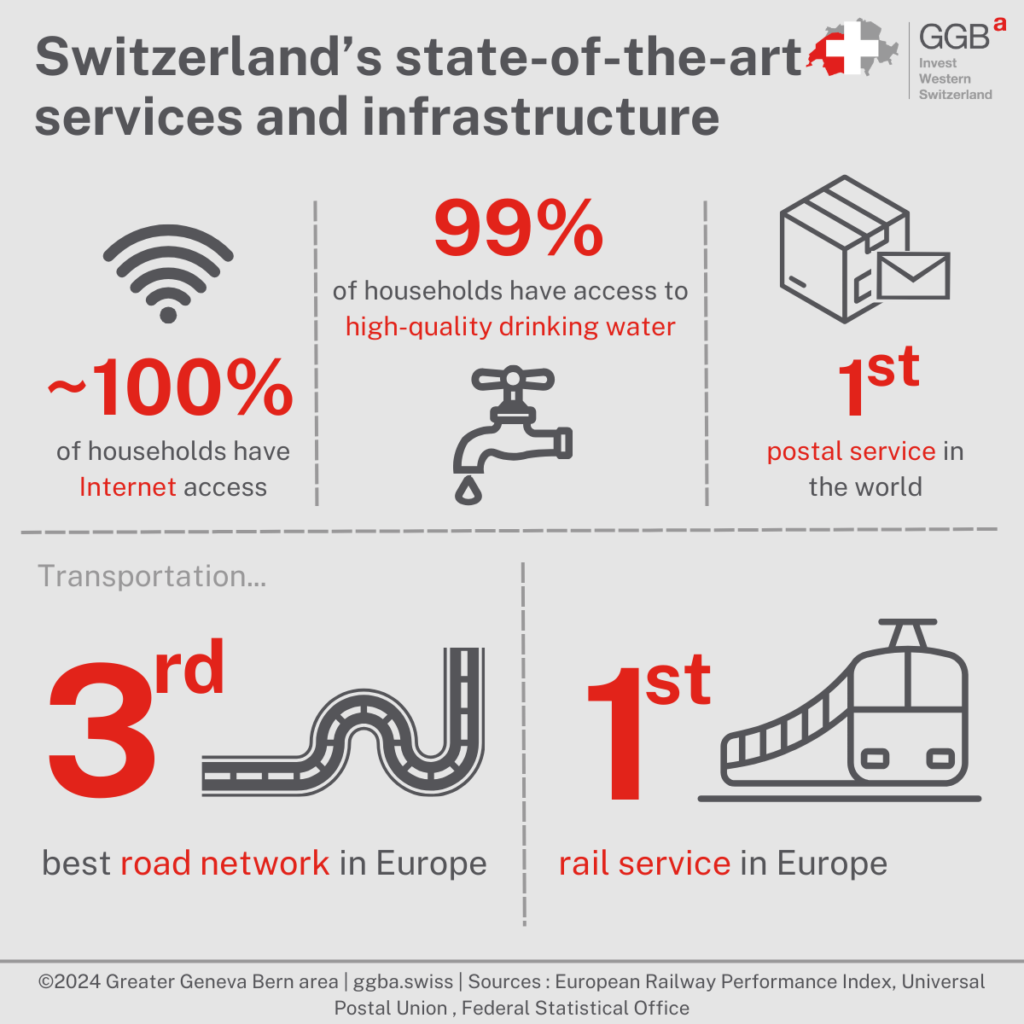
Innovation, research and talent: Switzerland’s long-term advantage
Switzerland is ranked the world’s most innovative economy by the Global Innovation Index, a position it has held for more than a decade. The basis of this leadership is structural: stable institutions, high R&D intensity, a strong university system, and a deep integration between research, industry and applied science.
A world-class education system
Switzerland’s education model is distinguished by its dual vocational training pathway. Nearly 70 percent of young people choose apprenticeships at age 15 or 16, alternating between academic learning and on-the-job training. This produces highly skilled workers and technicians who enter the labor market with practical expertise and strong career prospects. Manual and technical professions hold high social value and offer competitive salaries.
At the higher education level, Swiss universities consistently rank among the world’s elite. ETH Zurich, EPFL and the University of St. Gallen regularly compete with leading global institutions, while Swiss universities have produced 27 Nobel Prize laureates. Their research strengths include physics, engineering, computer science, life sciences, environmental sciences and economics.
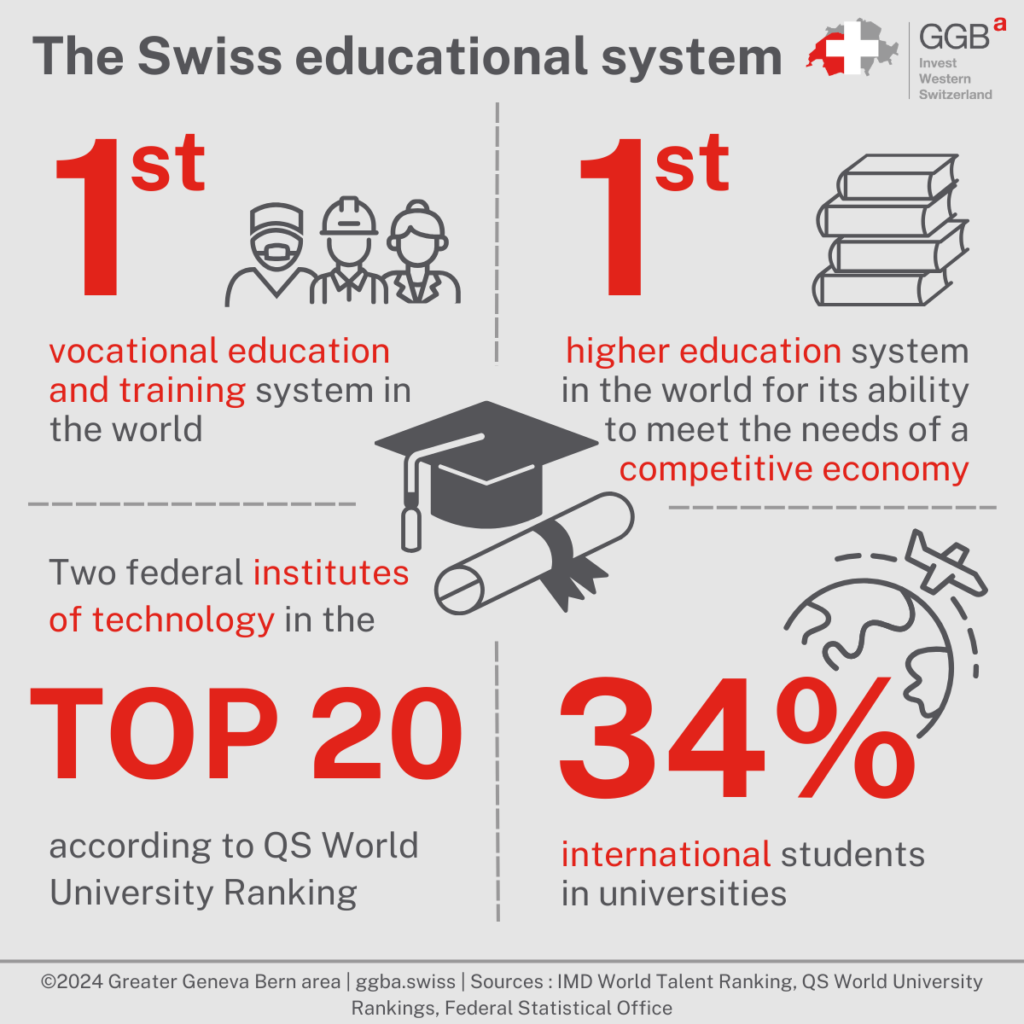
A strong R&D ecosystem
Switzerland invests heavily in research and development, both through public funding and private sector spending. The life sciences sector alone accounts for a significant share of national R&D expenditure. Institutions such as the Paul Scherrer Institute, CERN (accessible to Swiss researchers through long-standing collaboration), the Swiss National Science Foundation (SNSF) and the Centre Suisse d’Electronique et de Microtechnique (CSEM) support cutting-edge research across disciplines.
Western Switzerland is particularly strong in robotics, machine learning, computational science and nanoengineering, hosting initiatives such as the Idiap Research Institute, HEPIA, Microcity, and the Swiss Data Science Center.
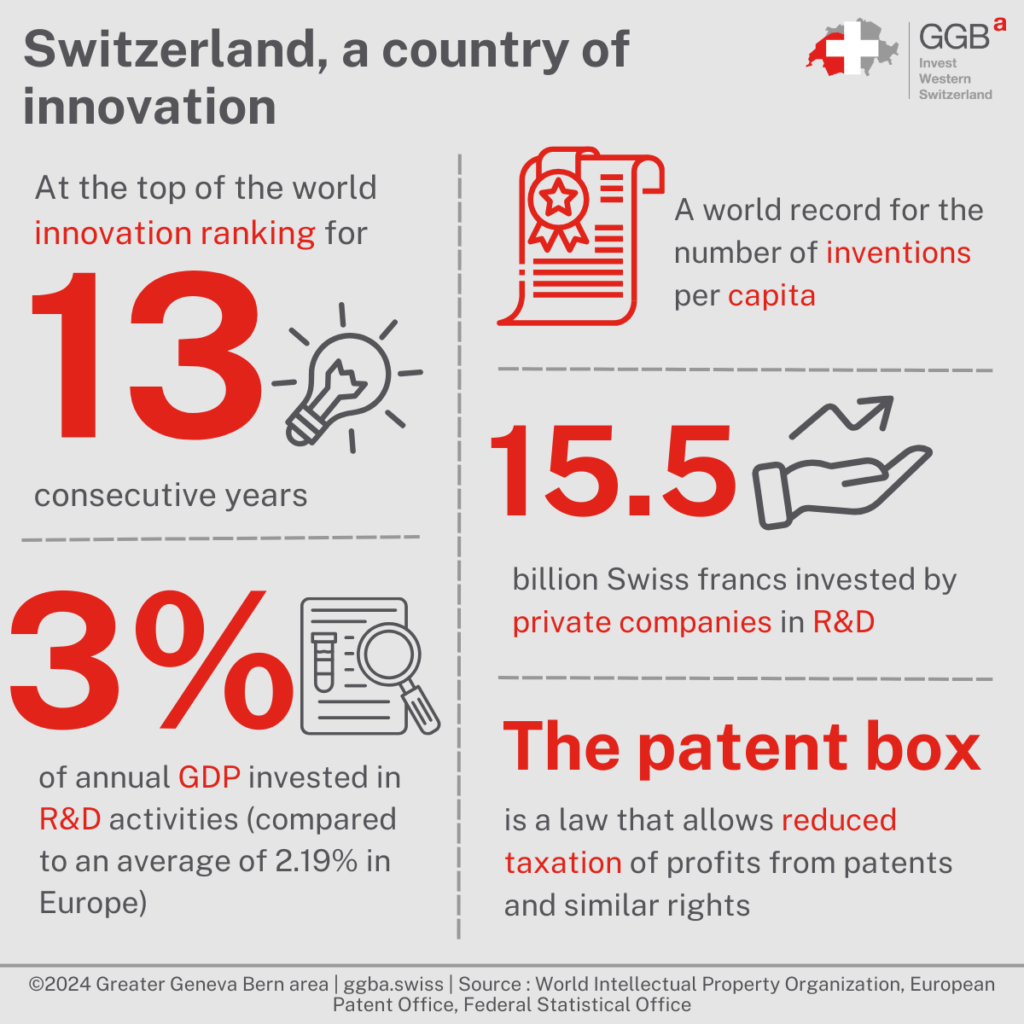
Working in Switzerland: productivity, wages and quality of Life
Swiss employees enjoy some of the highest wages in the world, but these wages correspond to high productivity, a skilled workforce and a competitive economy.
Working hours and employee rights
Typical working hours range from 40 to 44 hours per week depending on sector and employer. Employees are entitled to at least four weeks of paid vacation per year, with five weeks commonly granted for younger employees.
Sick leave provisions are generous by international standards, and many companies offer supplementary insurance coverage. Parental leave frameworks are evolving, with maternity leave federally mandated and paternity leave introduced in 2021.
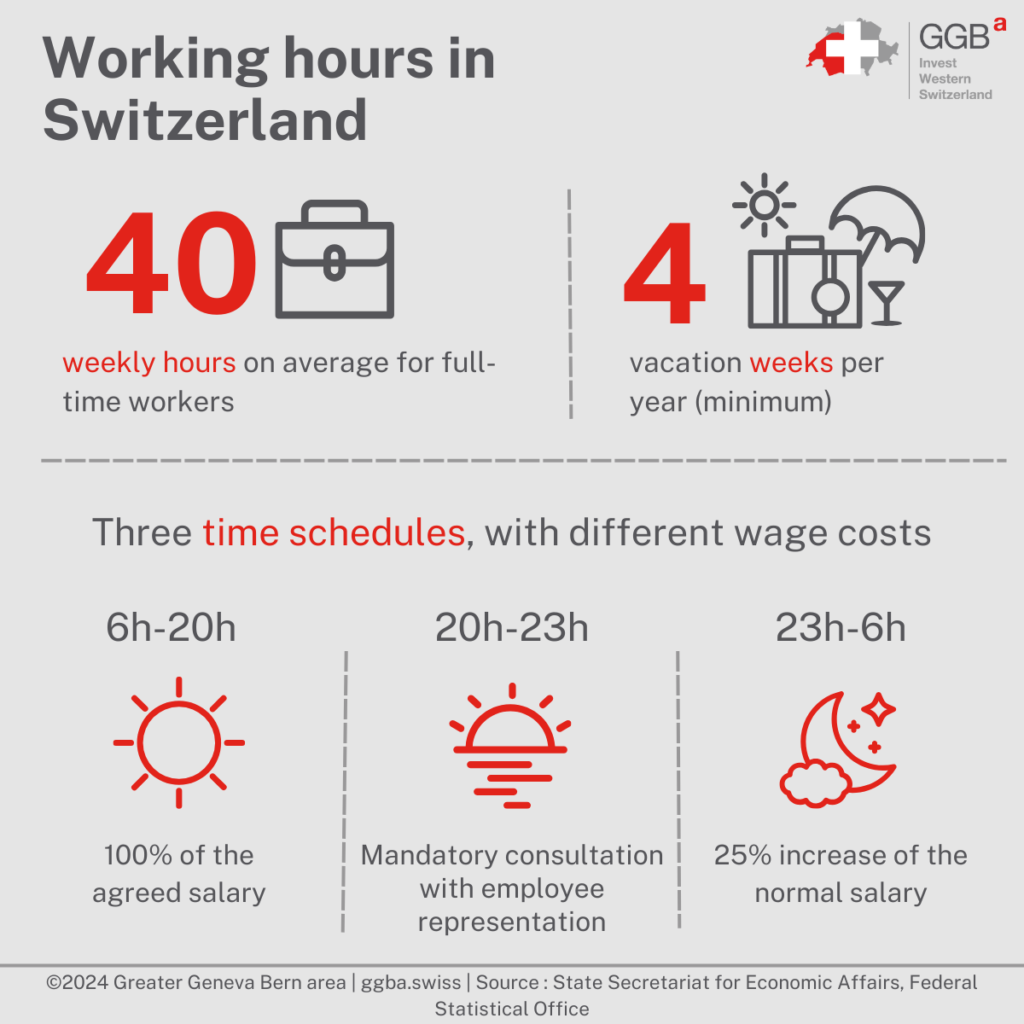
Social security system
Swiss social security is structured around several pillars:
- Old age and survivors insurance (OASI) and disability insurance (DI) financed through payroll contributions
- Occupational pensions through employer-sponsored plans
- Voluntary private retirement savings
This multi-tiered architecture ensures financial security while encouraging personal responsibility and long-term savings. Healthcare is based on mandatory private insurance with standardized benefits and optional supplemental coverage.
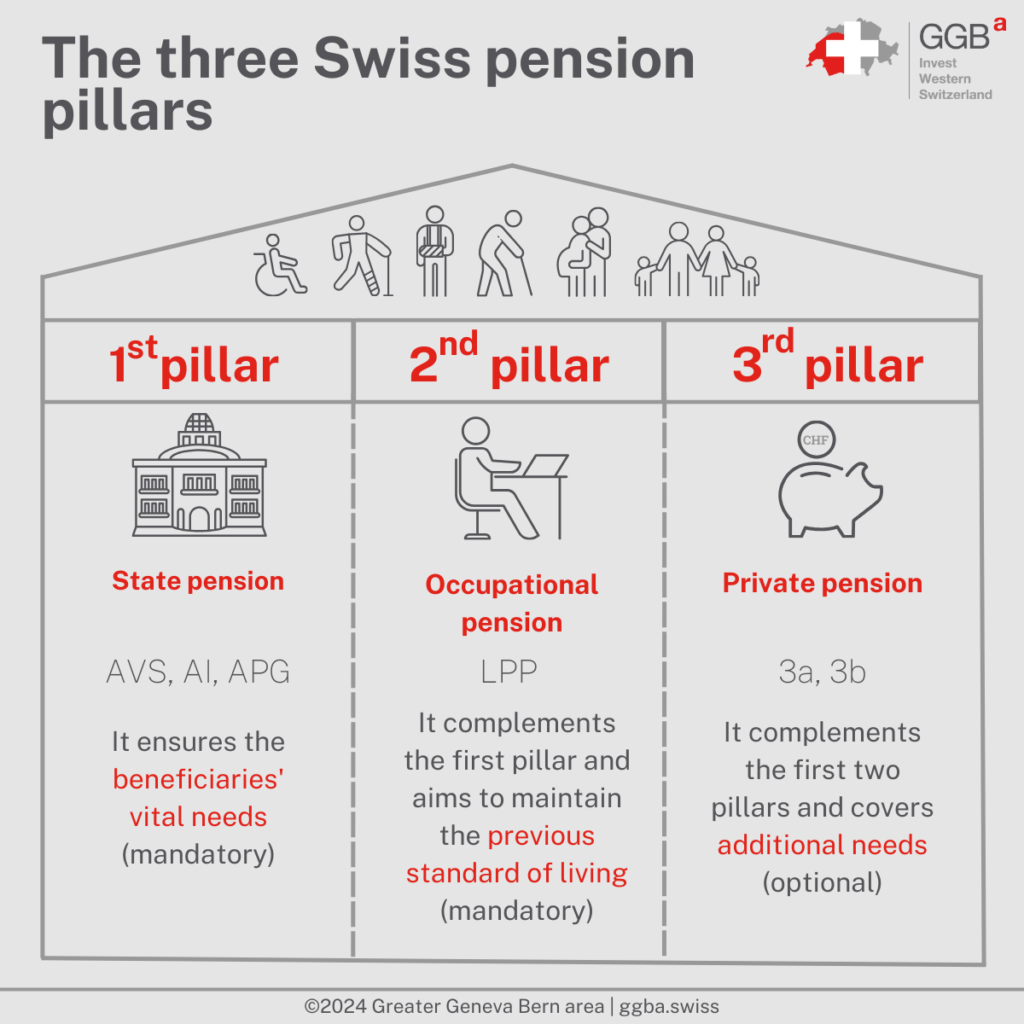
Taxes, business environment and financial stability
Switzerland’s tax environment plays a significant role in attracting companies and skilled workers. While tax rates vary by canton and municipality, corporate and individual taxation remains competitive.
Corporate taxation
Corporate tax rates in Switzerland typically range from 12 to 22 percent depending on location, making the country attractive for international headquarters, R&D centers and trading operations. The tax system emphasizes clarity, predictability and alignment with international standards. Switzerland actively collaborates with the OECD on global tax reforms and has modernized its corporate tax code following international agreements.
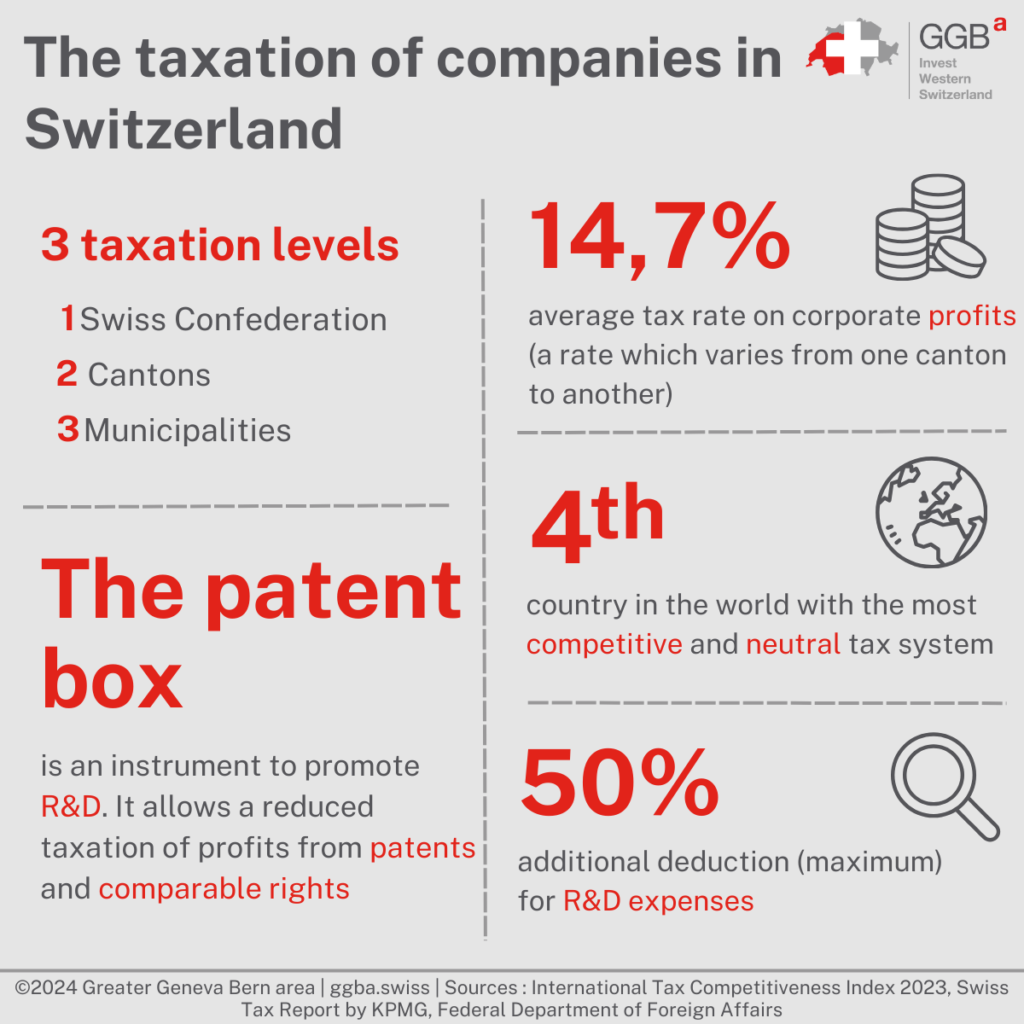
Taxation of individuals
Personal income tax combines federal, cantonal and communal components. Despite this multi-tiered structure, effective rates remain competitive due to deductions, moderate federal taxation and attractive rules for expatriates. Wealth taxation varies by canton but is generally modest when compared with other OECD countries.
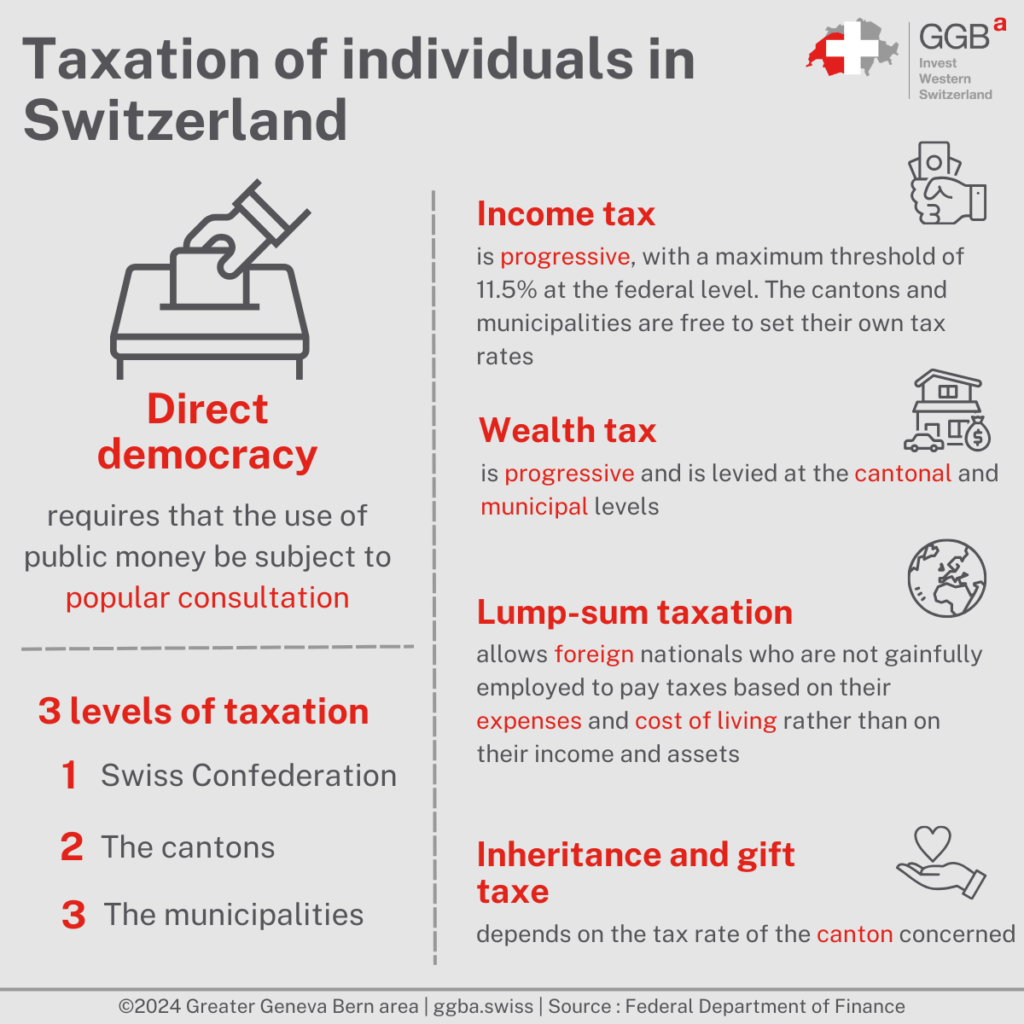
VAT and indirect taxes
Value-added tax (VAT) in Switzerland is among the lowest in Europe at 8.1 percent, with reduced rates for food, books and certain services. This benefits consumers, businesses and retailers while supporting price stability.
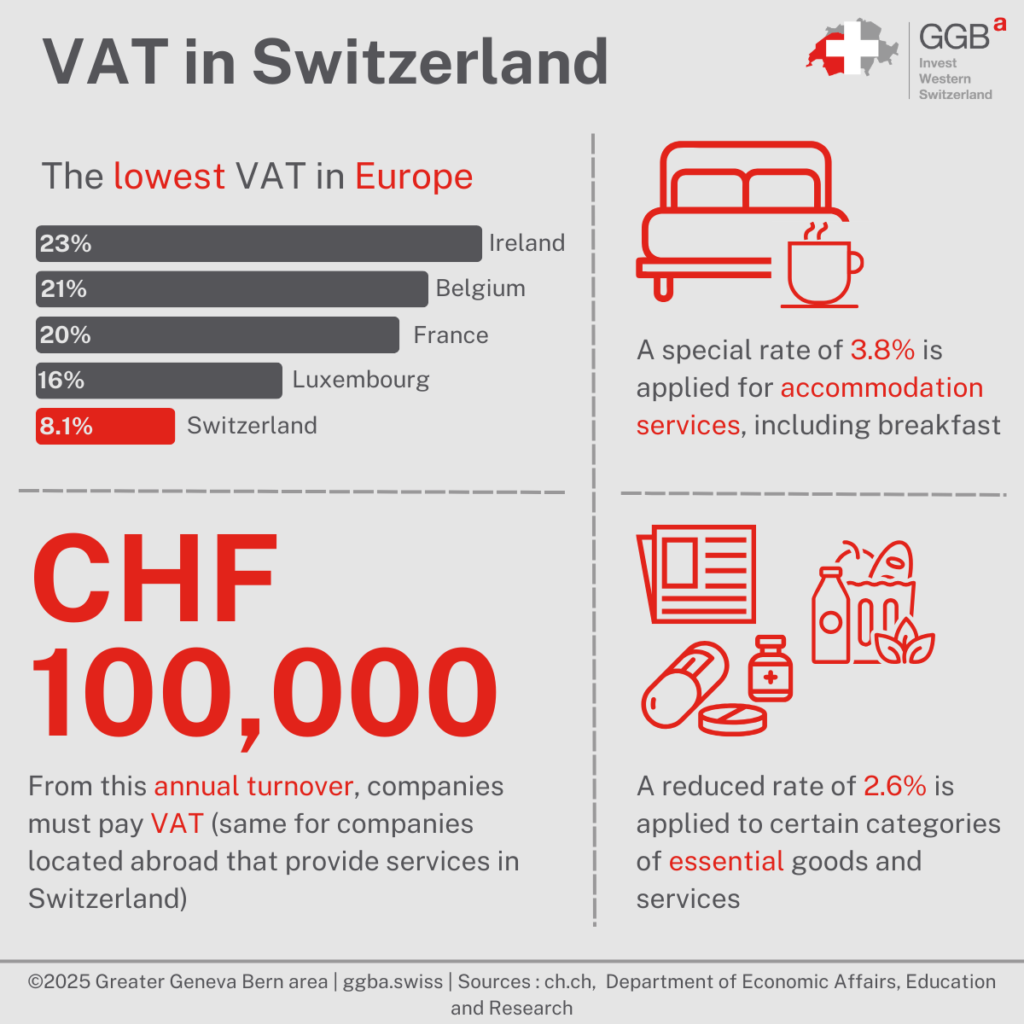
Financial and regulatory stability
Switzerland’s budgeting framework, including its constitutional debt brake, has produced consistent fiscal discipline. Public debt remains low relative to GDP, and the country maintains the highest possible credit ratings. Regulatory quality and administrative efficiency reinforce investor confidence.
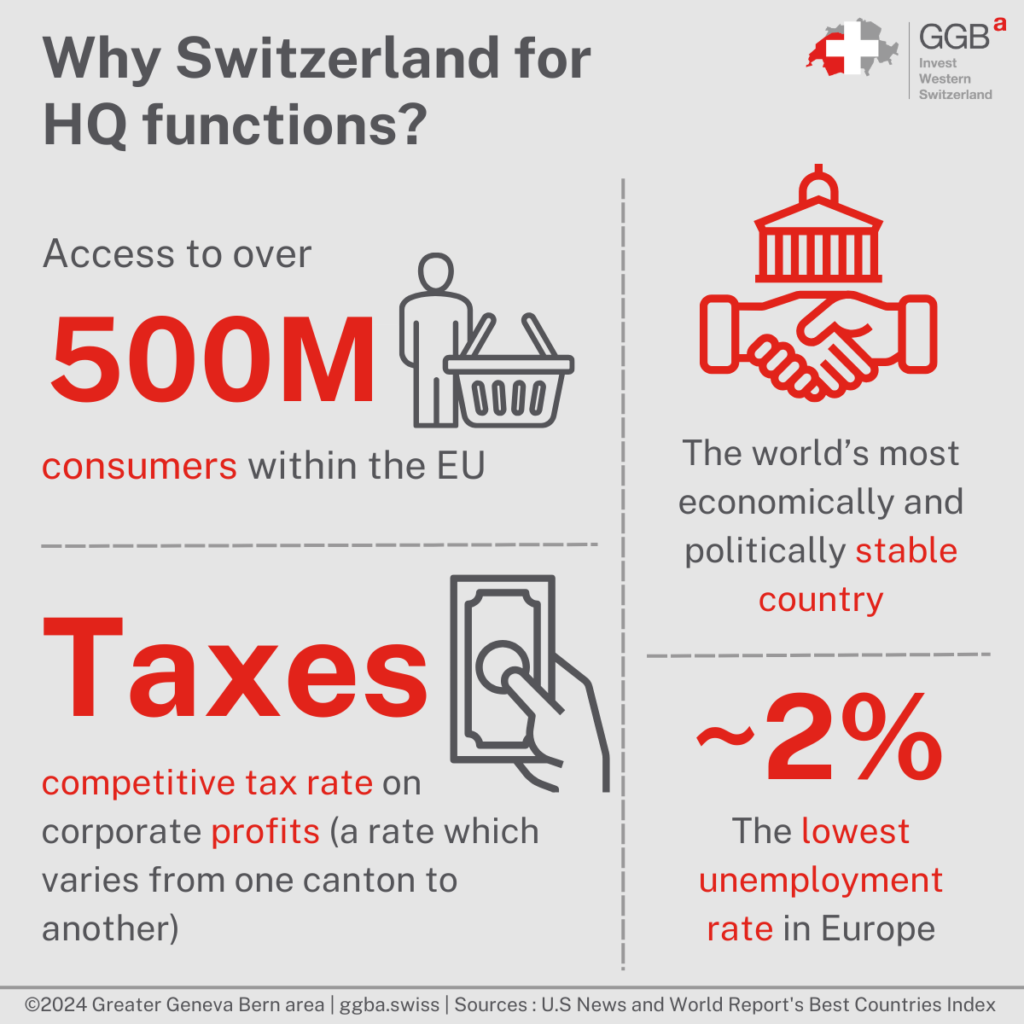
Transport infrastructure: reliability as a national value
Switzerland’s rail network is one of the most punctual and efficient in the world. In 2024, more than 93 percent of trains operated on time under Switzerland’s strict definition of delays. High-speed connections, dense urban rail networks and cross-border lines connect Switzerland seamlessly to European hubs such as Milan, Paris, Munich and Frankfurt.
Public transport integrates rail, bus, tram, cable car and ferry systems through unified ticketing and coordinated timetables. Zurich Airport and Geneva Airport provide international connectivity, while regional airports support cargo and business aviation.
Road networks are equally advanced and maintained to high safety standards. Despite challenging geography, the country has built extensive tunnels, bridges and alpine corridors that ensure year-round connectivity.
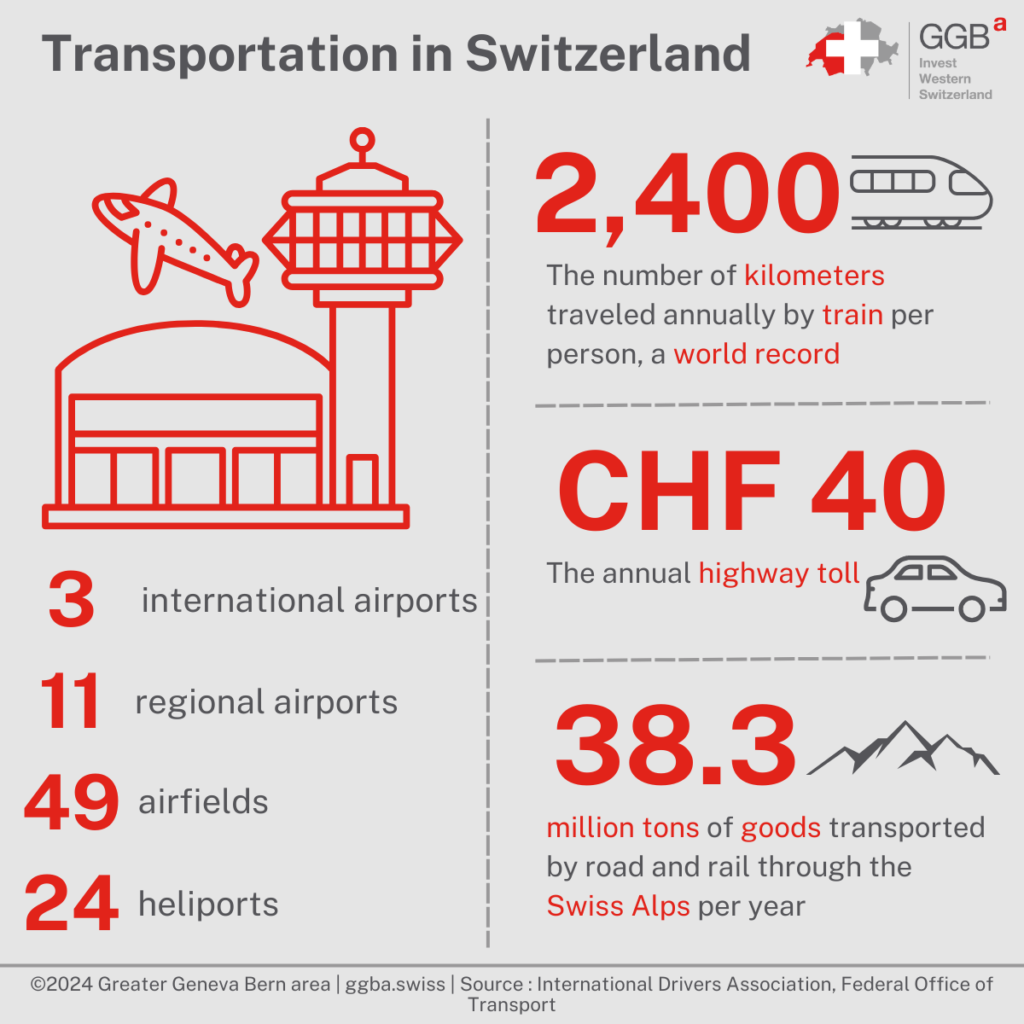
Institutions, governance and trust: the foundations of stability
Switzerland’s political system is based on federalism, subsidiarity and direct democracy. Citizens can challenge any parliamentary decision through referendums or propose legislative changes via popular initiatives. This structure produces political stability, long-term predictability and high levels of trust.
A culture of consensus
Consensus-driven decision making has created an environment where policy shifts occur gradually, avoiding abrupt changes that could disturb economic planning. Institutions enjoy strong public legitimacy, with more than 60 percent of Swiss citizens expressing trust in government according to OECD surveys.
Rule of law and legal certainty
The Swiss legal system is known for predictability, efficiency and transparent procedures. Intellectual property rights are rigorously protected, which is crucial for innovation-intensive industries.
A model built on long-term choices rather than natural advantages
Switzerland’s success cannot be attributed to one factor alone. It is the outcome of layered decisions that compound over time: neutrality, fiscal discipline, investment in education, commitment to infrastructure, respect for vocational training and a culture of consensus that anchors stability. Its geographic position at the heart of the European “Blue Banana” economic corridor is an advantage, but not a guarantee.
By focusing on producing high-quality goods and services rather than competing on price, Switzerland has built a diversified, resilient and innovation-driven economy. Its universities train world-class talent, its political system encourages public engagement and its infrastructure facilitates movement, trade and scientific collaboration.
Switzerland’s story shows that economic success can grow from structural constraints when paired with consistent strategy, geopolitical awareness and institutional trust. In a world where volatility is the norm, the Swiss model offers a rare example of long-term continuity and quiet, sustained competitiveness.

